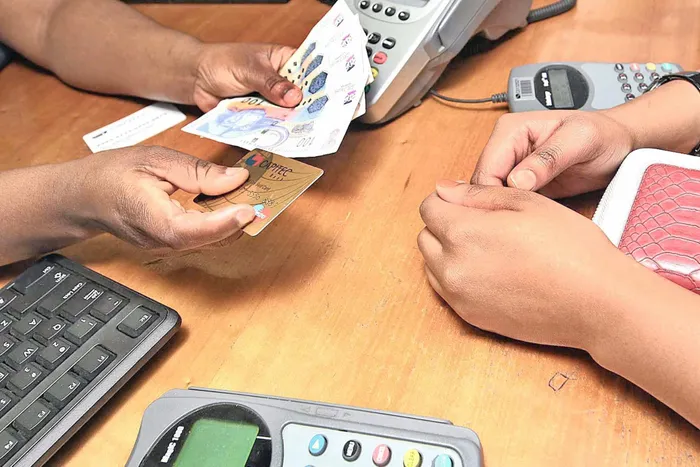The impact of inflation on debt review applications in South Africa

This article delves into the factors driving debt review applications in South Africa, highlighting expert opinions on consumer financial health and the implications of rising costs. Picture: Simphiwe Mbokazi, Independent Newspapers.
By: Nicola Mawson
It’s October and the courtroom in the Johannesburg Magistrate’s Court is quiet. Just a few lawyers and a magistrate who is reviewing – approving, denying, or asking for more information – applications for debt review put before the court by debt counselling companies.
Yet, there are times when the court roll will be fuller. Times such as January, when the festive season and back-to-school spending catch up with consumers. School holidays, or electricity price hikes, also see an increase in applications.
While official inflation is currently 2.9%, South Africans have gone through a prolonged period of higher prices, with regulated drivers such as electricity and fuel being large contributors. Food inflation has remained stubbornly high.
Benay Sager, executive head of DebtBusters and chairman of the National Debt Counsellors' Association, said applications tended to increase in the first and third quarters of the year as people found themselves battling additional expenses such as back-to-school textbooks and clothes.
Then, said Sagar, there was also an increase in medical aid costs, placing further pressure on consumers. The potential effect of Two-Pot withdrawals to pay down debt, however, had yet to be seen.
As of the end of the third quarter of last year, South Africans had borrowings of R2.47 trillion, with total overdue balances at 8% of the total outstanding debt, according to Eighty20’s latest Credit Stress Report in collaboration with Xpert Decision Systems. This report also found that fewer people are defaulting, and the proportion of loans in good standing (64.5%) was higher than just before COVID-19.
TransUnion’s Consumer Pulse Survey for the fourth quarter of last year found that 35% of consumers are unable to pay their bills in full each month and, while the outlook is improving, customers are still cutting back on discretionary spending.
Neil Roets, founder and CEO of Debt Rescue, said there had been a rise in applications brought to court for debt review in 2024. He attributed this increase to the ongoing impact of high inflation and elevated interest rates, which have left many South African consumers struggling to manage their financial commitments.
Sager told Personal Finance that new applications a month have been hovering around the 12 000 to 15 000 mark a month for some time. “I think that’s quite low, to be honest. What we hear about people’s financial situations and what we also hear from the credit bureaus, in my opinion, it should be many times more than that,” he said.
Roets added that most debt review applications are approved swiftly, “underscoring the essential role of debt review in providing much-needed relief to over-indebted individuals”. In cases where approval is delayed, it is typically due to procedural court requirements that cause postponements. However, these matters are generally resolved promptly, ensuring approval is secured, he added.
People generally file for debt review for a few reasons, said Sager:
- The most prevalent is something unexpected that impacted their financial situation such as a of loss income or an incident such as a hospital bill that wasn’t catered for
- A succession of loans that then cumulatively became too expensive to service – Sager noted that the interest rate for unsecured loans was the highest it has been in the past decade.
Sager said people should consider debt counselling under conditions in which they have debt that exceeds their income. Other aspects could include that someone has not made significant progress in paying down a large, unsecured, loan over the past six months, he said as an example.
Roets said that debt review is a vital solution for consumers who are living on credit, unable to afford their basic living expenses, and struggling to meet even the minimum repayments on their debts. “These conditions are clear indicators of over-indebtedness, where debt review offers a structured and legally protected means to regain financial stability,” he said.
Debt counselling, said Sager, is generally embarked upon by financially responsible people who want to have a good credit record moving ahead. In most cases, he said, the process means that your credit score is frozen and can only improve.
Roets added that the benefits of debt review include reduced monthly payments, protection of assets, and the ability to prioritise essential living expenses.
- The process of applying for debt review is simple in nature, but does require quite a bit of paperwork:
- The consumer works out their debt profile in conjunction with a debt counsellor, which is generally income and expenses and requires spending to be cut as much as possible
- Paperwork such as bank account statements need to be collated and forms filled in
- A repayment schedule is worked out after confirmation of the debt is received from creditors
- The debt review company lists the consumer on the National Credit Bureau’s NCR Debt Help database
- NCR notifies credit bureaus that the consumer has applied for debt review
- A debt repayment plan is worked out with creditors
- The plan then needs to become an order of court
- A debtor pays the agreed monthly amount to the debt review company, which then pays it over to creditors as agreed. There are fees involved, which could be taken off upfront. This is important to check
The typical debt review period is between 36 and 60 months, depending on the amount of debt to be paid off. During this time, the consumer cannot apply for more credit.
Source: Various
PERSONAL FINANCE